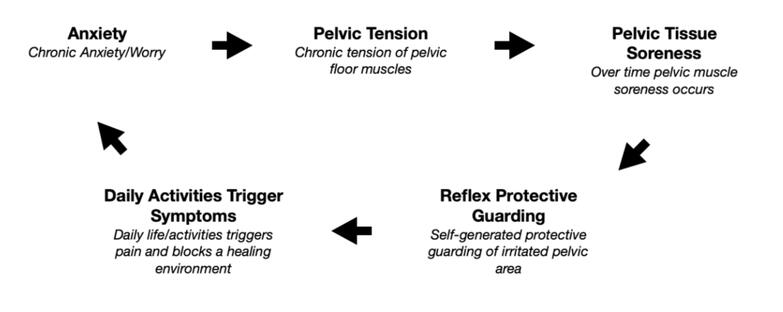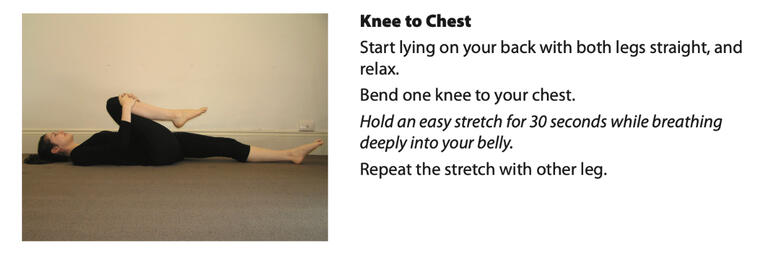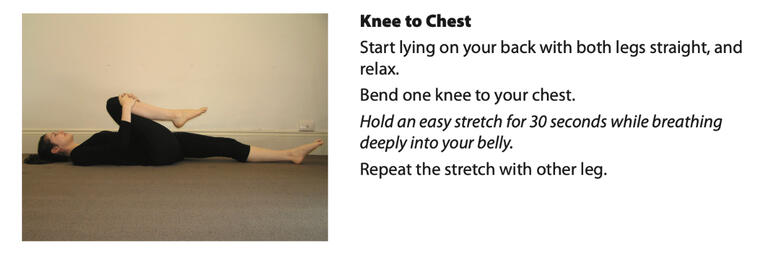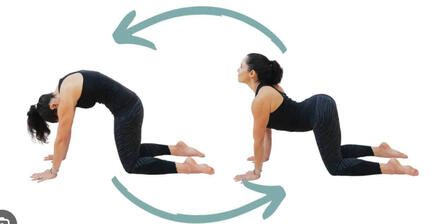Living with Male Pelvic Pain
Terms like CPPS (Chronic Pelvic Pain Syndrome), Chronic non-bacterial Prostatitis, Pelvic Floor Dysfunction, 'Hard Flaccid Syndrome', typically all refer to the same set of symptoms.This is a page detailing my experience of living with this condition for over 10 years (don't let that scare you I'll get to the timeline later), how it tends to appear, and what you need to do to get better. This is all just my experience dealing with this myself and with my PT and therapists so isn't official medical advice etc.
What symptoms are typically caused?
CPPS can cause a wide variety of symptoms, many of which I have had personally at one point or another. It's important you don't start catastrophizing based on this, that one symptom is a sign of 'worse' issues than another. These symptoms can wax and wane, and although they are a pain (no pun intended) while you have them, they will not cause permanent injury.Physical symptoms include:
Dull aching in pelvis
Pain when sitting
Erectile Dysfunction
Pain after ejaculation
Urinary Frequency/Urgency
Constipation
Sensory changes in genital area
Pain in Perineum
Pain in Penis (shaft/tip)
Pain in Testicles
'Hard Flaccid'
'Hourglassing' shape of penis
Abdominal Pain
Lower Back Pain
Feeling of needing a bowel movement when you don't
'Golfball in the rectum'/tension feeling
Post-bowel movement pain
This list is not exhaustive, and as you can see can be a wide variety, including all types of pain (Dull, Nerve, Burning).
Who gets it and why does it happen?
Pretty much anyone can get it, but the guys reading this will tend to have anxious personalities, this is not a coincidence.The currently accepted explanation (which stacks up so believe it) is that you get a minor injury or strain in the groin area, could be from sport, jerking it, constipation etc. This causes some pelvic-genital symptoms, you then 'freak out', and your sensitivity to the symptoms keeps them going.It is a natural reaction of the body to tense when we are stressed, and so people who are often stressed tend to do this subconsciously. The symptoms can all be explained by tension in your pelvic floor muscles.

My experience
I've had this since my teens, and the symptoms have ebbed and flowed over this time. I have had years where there was no issue, and months recently where I was effectively bed-bound with pain, in the worst bout of pelvic pain I have ever had. I am now 80% recovered from this bout, and am writing how I got better.I have largely had to learn how to deal with this myself, and what type of tension causes what symptoms.I am in the UK, and treatment here for this problem is pretty bad. I spent years trying to get NHS physiotherapy, getting put on a 5 year waitlist only to be told at the end 'men can't get that - we only treat women'. Knowledge of this issue is pretty scarce among healthcare professionals, and often you will need to go privately for treatment. Urologists often can't find anything wrong (because from a urological perspective there isn't), and scans come back all negative. You should be prepared for this response especially if you're in the UK.Only working on stress and anxiety management, alongside putting real time into pelvic floor exercises made a difference to me. My symptoms are highly correlated to my anxiety levels, and often disappear entirely when drunk.I am diagnosed with General Anxiety Disorder and have a long history of OCD, many of you reading this will have similar, I'm not going to go into a mental health spiel - just go see a therapist.I'm writing this website because a lot of info especially on forums sucks and it's hard to find 'one place' that describes the bulk of this issue.
First Steps
I will post below what I do, this is based on input and advice from PT's I have worked with, and based on what has made me better. Don't hold me responsible if you injure yourself overdoing it or similar, I don't imagine you will but this is purely me describing what worked for me.
Go see a primary care doctor - See your doctor and tell them what you have, what you think is going on. Have the tests and see the specialists they recommend, you could have something else wrong with you that gets flagged. It's not a bad idea to have your GP involved in this, even if they can't help much. Tell the what you're doing and act under their advice.
Speak to a Pelvic Floor PT who treats men - If it's in person great, if not, go online, having someone you can speak to is super important and they can advise you going forward.
Get a therapist - If you have OCD go do ERP, if you have anxiety or depression go do CBT. Just get a therapist and talk to them about your anxiety and what is worrying you, don't be embarrassed about telling them about physical issues you have - many physical things can be caused by mental health problems and stress. There is a strong mind-body connection.
My Routine
This is my personal routine, this may not be the best one for you (talk to a PT), but this has helped me, I do it twice a day, this is in combination with constantly 'relaxing' my pelvic floor/doing reverse kegels when I notice it tense, all through the day:
30 mins meditation - A mix of the discontinuation of effort/mindfulness and purposeful diaphragmatic breathing/reverse kegels.
Hold all stretch exercises for 30-60 sec, to point of increased tension, 1-2 on pain scale.
Spiky ball massages on abdomen, legs and under feet.
Foam roller releases on legs.
15 mins light walking.
Perineal light massage
Some resources:Reverse Kegels Instructions: (https://www.youtube.com/watch?v=mirmW8V611E)
Belly Breathing: (https://www.youtube.com/watch?v=TuCWFozVPM0&t=346s)
Wall Specific Stretches: (https://www.youtube.com/watch?v=MheeJCgRUFo)
Foam Rolling Exercises: (https://pelvicpainrehab.com/blog/foam-rolling-for-pelvic-pain-relief/#:~:text=Since%20foam%20rolling%20can%20directly,pain%20or%20pelvic%20floor%20dysfunction.)
Perineal Massage Info:
Massage of the perineum focuses on the bulbospongiosus and ischiocavernosus muscles. These muscles particularly are involved in penile pain, post ejaculation pain, and hard flaccid.I do light massage, feels tender and 1-2 on pain scale if it's tense, I just slowly massage the area lightly and the above symptoms tend to improve dramatically.- Left of the mid line from anal area up under the scrotum to the base of the penis (bulbo muscle)
- Right of the mid line from anal area up under the scrotum to the base of the penis (bulbo muscle)
- Further left of the mid line area from anal area up under the scrotum to the base of the penis (Ischio muscle)
- Further Right of the mid line area from anal area up under the scrotum to the base of the penis (Ischio muscle)
- Sweeping down from above anal area to the right sit bone
- Sweeping down from above anal area to the left sit bone
Stretch exercises
This is my stretch routine that I worked out and have done under supervision of my PT, once again get a PT and get some advice, but these work for me:In particular happy baby, cat-cow (the last one), flat frog and cobra.














Dealing with specific issues
There are some symptoms that caused me a ton of issues and pain. Again, I'm not a doctor, I'm just telling you what I did to help these very specific issues, and much of this was under a PT instruction. I wanted to list them because they ruined weeks of my life and it was trial and error for me in dealing with them.
Burning Pain in perineum, going up into penis - This f*cking sucks. I was in bed for weeks doing diaphragmatic breathing trying to sort this, it was like my whole urethra was burning. This I found was solved by simple light massage of the perineum. I always avoided that area and though it was supposed to hurt when you pressed on it, my physio said it should feel supple and not hurt like any other muscle, light massage until it stops feeling tender got rid of weeks of pain in about 2 days when I figured this out. This also goes for post ejaculation pain.
Lower abdominal pain - My whole lower abs for a while felt really tense, with an aching muscle pain that made me feel like I needed to bend over slightly. I bought a spiky massage ball and rub it on the area lightly and this makes a big difference. I also bought massage oil and give light self massage of the whole abs area which takes a bit of time, but definitely makes it go down.
Constipation - Caused by sphincter and pelvic muscles being too tight, get a stool or raised platform to put your feet on when doing a bowel movement. Western toilets are not actually well designed for the shape of the bowel, moving your legs into this position helps. Do not strain, if you can't give up and come back later. Deep belly 'moo' breathing helps.
Post-bowel movement pain - Normally lasts about 30 mins and hurts a lot. This is your muscles just spasming. Don't freak out, I've found the happy baby pose works best here, or laying on your back with feet up flat against the wall, so your knees are a right angle. Do your diaphragmatic breathing and relax, they'll stop way quicker. This can also be called anismus or proctalgia fugax if it's short lived.
What now?
One of my biggest issues was feeling pretty alone in dealing with this, it felt like I had this rare issue no one else had, doctors didn't know how to help, I could see the occasional physio online or sometimes in person but then I was on my own.You need to realise that you don't have anything majorly wrong. I know that feels really hard to accept but it's important you don't get into a habit as I did for a while of 'training' your brain to expect pain, or that you're 'incapable' or normal living.Meditate, speak to a PT, speak to a therapist. Do the stretches, gradually bump your exercise levels up and just start trying to live a normal life. Other people actually get these symptoms all the time, having pulled a muscle or got an injury, think nothing of them and they go back to normal. Our personalities are wired to overthink and catastrophize, and we then fixate.You have not been left in some void of medical science where no one knows what's going on (even if it feels like it). Your symptoms are easily explainable. Therapy, PT, and carrying on as much as possible with your normal life is how you deal with it. It will wax and wane, I see the symptoms sometimes as a reflection of my mental state. I try not to be afraid of it, it won't cause me any serious harm, I have let it steal enough time away from me already, it's unnecessary for you to do the same.
FAQs
Is it permanent? - This is like asking if headaches are permanent. Yes you can get pain from it time and again, it is natural for muscles to tense when stressed, anxious or injured, so it's likely you will have some symptoms up and down. You can however bring the dysfunction and effects on your daily life down to pretty much 0.
Have I got nerve damage? - I used to worry about this due to sensitivity, 'feeling' changes in the genital area. From what I've been told by PT's who are experts, tension can impact blood flow or put slight pressure on aspects of the pudendal nerves. It is highly unlikely this will ever become permanent nerve damage, I was told you generally need some serious injury to cause that, not a bit of muscle tension.
Should I keep posting on and reading reddit/forums every tiny symptom I get? - No stop being obsessive. Occasionally asking about a certain issue is okay but don't depress yourself reading stories online, most people who get better just leave.
I can't find a PT how do I find one? - Obviously Google is your friend here, even online consultations can be super helpful. Your pelvic floor has become used to being too tight, and your behaviour, conscious and subconscious, creates that. An hour a week in a physio room won't be the thing that fixes that, it takes longer term, daily, consistent retraining of these muscles and awareness of the triggers for you. Ask the PT if they've treated pelvic floor hypertonicity before, it's important you have one who has, else you'll end up being given the wrong exercises like strengthening or pilates exercises.
Can I have sex with it like this? - Yeah, but it might hurt after, pay attention to how the rest of your symptoms are. Do not stay erect for a long period of time, this puts the bulbo and ischio muscles under a lot of strain.
I came here looking for someone to tell me to just do X and it will get better - It doesn't work like that, this tension in your pelvic is learned over time. It takes time to unravel, which comes from consciously relaxing the area, doing reverse kegels, avoiding stress. There is no super quick fix unfortunately. Make regular stretching a part of your day, make relaxation exercises a part of your day, and do it over time.
Do I need internal PT? - I haven't had it at this point, and have made a lot of progress, I think it probably does help, I just haven't had access yet. My assumption is it might be slower getting better without it, but ask a PT about your specific situation.